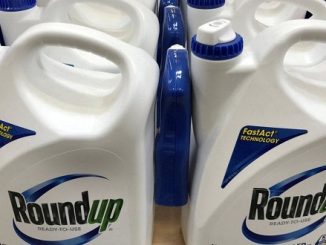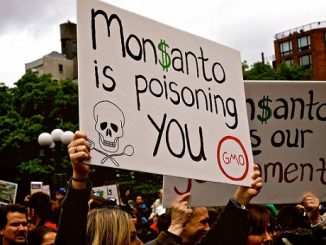
By Carey Gillam journalist and author, and a public interest researcher forUS Right to Know, a not-for-profit food industry research group.
At the age of 46, DeWayne Johnson is not ready to die. But with cancer spread through most of his body, doctors say he probably has just months to live. Now Johnson, a husband and father of three in California, hopes to survive long enough to make Monsanto take the blame for his fate.
On 18 June, Johnson will become the first person to take the global seed and chemical company to trial on allegations that it has spent decades hiding the cancer-causing dangers of its popular Roundup herbicide products – and his case has just received a major boost.
Last week Judge Curtis Karnow issued an order clearing the way for jurors to consider not just scientific evidence related to what caused Johnson’s cancer, but allegations that Monsanto suppressed evidence of the risks of its weed killing products. Karnow ruled that the trial will proceed and a jury would be allowed to consider possible punitive damages.
Johnson’s case, filed in San Francisco county superior court in California, is at the forefront of a legal fight against Monsanto. Some 4,000 plaintiffs have sued Monsanto alleging exposure to Roundup caused them, or their loved ones, to develop non-Hodgkin lymphoma (NHL). Another case is scheduled for trial in October, in Monsanto’s home town of St Louis, Missouri.
The lawsuits challenge Monsanto’s position that its herbicides are proven safe and assert that the company has known about the dangers and hidden them from regulators and the public. The litigants cite an assortment of research studies indicating that the active ingredient in Monsanto’s herbicides, a chemical called glyphosate, can lead to NHL and other ailments. They also cite research showing glyphosate formulations in its commercial-end products are more toxic than glyphosate alone. The International Agency for Research on Cancer (IARC) classified glyphosate as a probable human carcinogen in 2015.
“We look forward to exposing how Monsanto hid the risk of cancer and polluted the science,” said Michael Miller, Johnson’s attorney. “Monsanto does not want the truth about Roundup and cancer to become public.”
Monsanto has fiercely denied the allegations, saying its products are not the cause of cancer. The IARC finding was wrong, according to Monsanto, as are studies finding glyphosate and glyphosate-based herbicides like Roundup to be potentially carcinogenic. Monsanto points to findings by the Environmental Protection Agency (EPA) and other regulatory authorities as backing its defense.
“Glyphosate-based herbicides are supported by one of the most extensive worldwide human health and environmental effects databases ever compiled for a pesticide product,” Monsanto states on its website. “Comprehensive toxicological and environmental fate studies conducted over the last 40 years have time and again demonstrated the strong safety profile of this widely used herbicide.”
A company spokeswoman did not respond to a request for additional comment.
How the Johnson lawsuit plays out could be a bellwether for how other plaintiffs proceed. If Johnson prevails, there could be many more years of costly litigation and hefty damage claims. If Monsanto successfully turns back the challenge, it could derail other cases and lift pressure on the firm.
Monsanto’s lawyers plan to introduce evidence that other factors caused Johnson’s cancer, to challenge the validity of the science Johnson’s claims rely on, and to present their own experts and research supporting safety. The company has an EPA draft risk assessment of glyphosate on its side, which concludes that glyphosate is not likely carcinogenic.
https://www.theguardian.com/us-news/2018/apr/30/fda-weedkiller-glyphosate-in-food-internal-emails




Be the first to comment